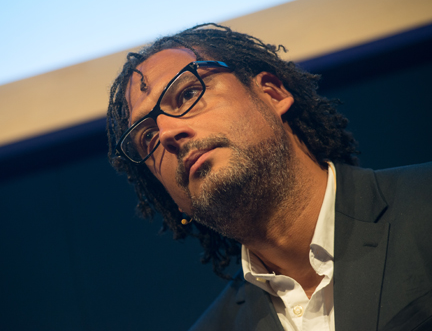More articles Sunday 20 August 2017 12:45pm
Historian David Olusoga Discusses Britain’s Forgotten History of Slavery

Historian David Olusoga has said that the omission of Britain’s history of slavery from school curriculums goes beyond neglect and into the realms of dishonesty and deliberate untruth. Speaking at the Book Festival, he discussed his new book Black and British: A Forgotten History, written alongside his award-winning BBC series following Britain’s brutal and intentionally obscured slave-owning past.
Olusoga described his own experience of British schooling – as a half-Geordie, half-Nigerian man growing up in the 1970s and 80s – where he was taught all there is to know about the industrial revolution and the working class of the north-east, but nothing of the 1.8 million slaves producing the cotton the mills needed to run.
Even now, in 2017, he said “there’s no optimism to be found in the British education system” when it comes to the teaching of the nation’s part in the slave trade and that hope for progress comes now from “different archives of history” – TV, public discussion, and vocalised memory.
For Olusoga, much of the problem lies in the “denial and disavowal” that comes with removing the white abolitionists from the context that preceded them: “Our monomania about abolition has lasted longer than slavery itself. It’s like reading the last chapter of War and Peace and then claiming you have an understanding of the entire novel.”
The BAFTA-winning presenter also questioned the moral capacity of society in the 21st century – “We know that our clothes are produced by children in factories. We know we have a moral problem with that. And yet we still permit it, I don’t see that same rejection as the abolitionist movement anymore.”
In a discussion which ranged from Bill Richmond to Barbara Walker, from the remains of two black Roman women to Donald Trump, Olusoga affirmed that the aim should be for people to talk about black history as a component of British history rather than a separate ‘other’.
“The idea that only black people can talk about black issues is dangerous. We need to see things together rather than as separate.”
Key to this movement is a rejection of the desire to always see good in our ancestors – Olusoga asked, “Why do we need them to be good?” Instead, he says, we should remove any sense of personal shame, guilt or responsibility and accept the weight of their actions as a nation.
He did, however, concede that this is easier said than done, and when asked about the state of America, days after the white supremacist marches in Charlottesville, Olusoga said again there is no cause for optimism. Indeed, quoting the German philosopher Oswald Spengler he said that in this situation, “optimism is cowardice”.
“Class has been weaponised so that race is becoming an issue that the Democrats can’t talk about if they want to win votes.”
But amongst the pessimism, there is the promise of new stories and collective recollections that, though often traumatic and painful to remember, can begin to draw together a sense of shared British history.
- 2026 Festival:
- 15-30 August
Latest News
 Major new partnership with Celtic Connections
Major new partnership with Celtic Connections



